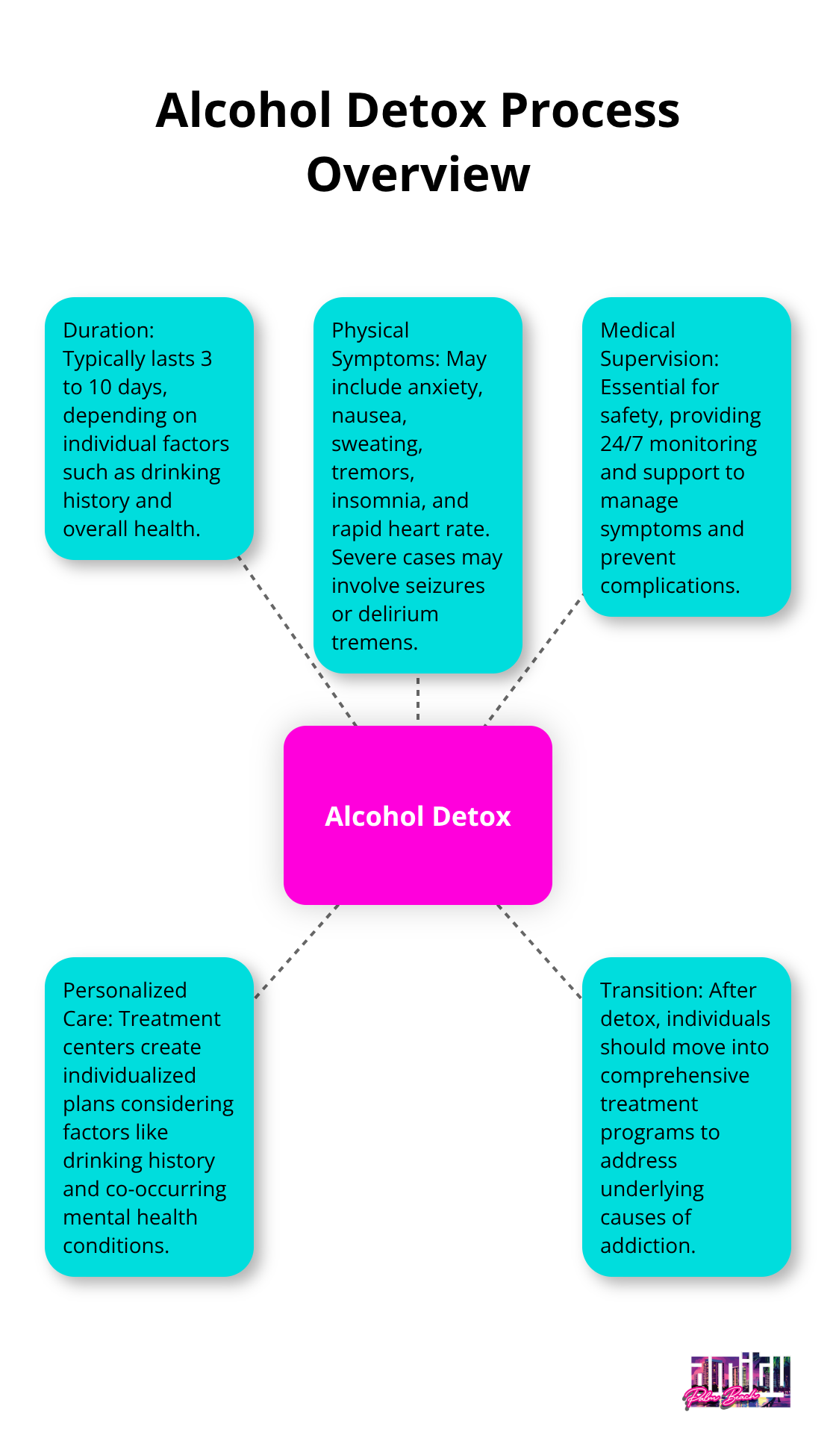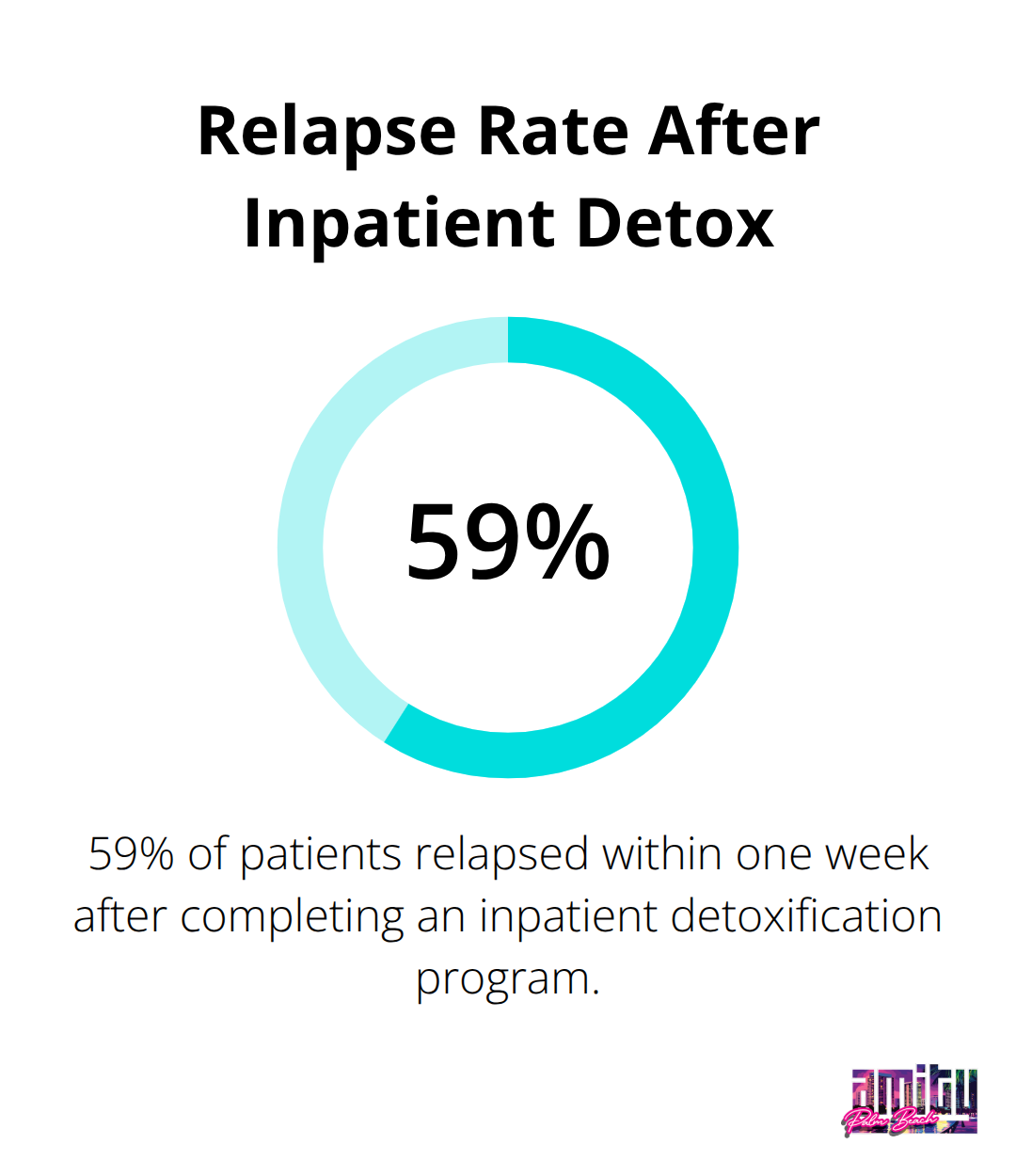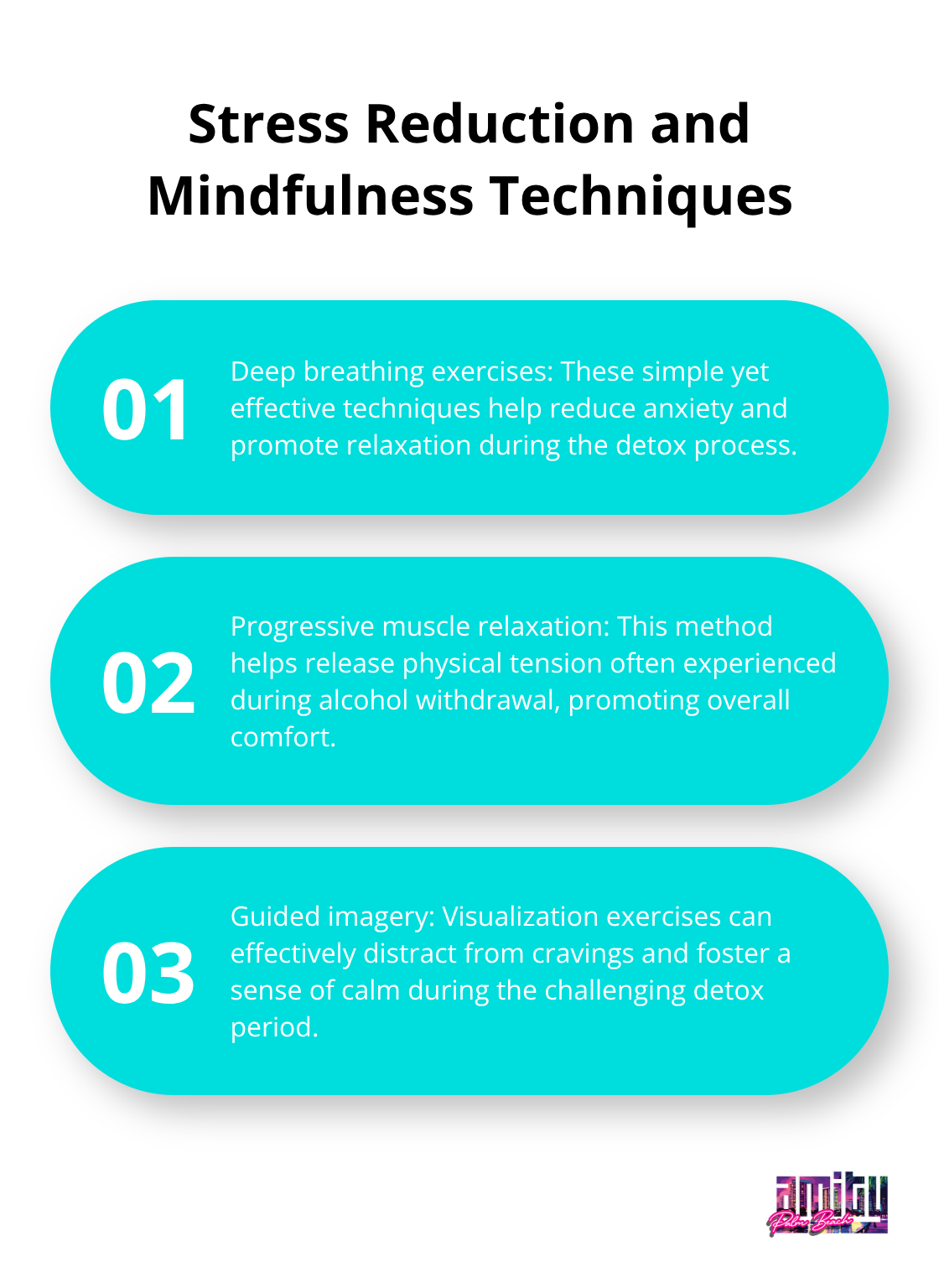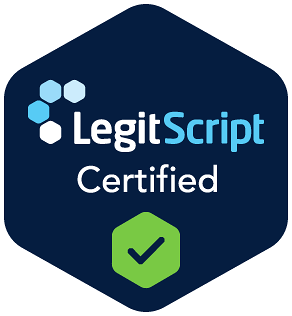At Amity Palm Beach, we understand the challenges of starting the journey to sobriety. Alcohol detox is a critical first step, but it can be daunting and potentially dangerous without proper care.
Our expert team is here to guide you through this process safely and comfortably. In this post, we’ll explore the essentials of alcohol detox, including medical approaches and holistic support strategies.
What Happens During Alcohol Detox?
The Detox Process Explained
Alcohol detox marks the first step in overcoming alcohol addiction. This process typically lasts 3 to 10 days, depending on factors such as drinking history, consumption levels, and overall health. During this time, the body eliminates alcohol and adjusts to functioning without it.

Common Withdrawal Symptoms
As the body detoxifies, a range of withdrawal symptoms may occur:
- Anxiety and irritability
- Nausea and vomiting
- Sweating and tremors
- Insomnia
- Rapid heart rate
In severe cases, some individuals experience more serious symptoms like seizures or delirium tremens (a potentially life-threatening condition).
The Necessity of Medical Supervision
Medical supervision during alcohol detox is essential. More severe symptoms, such as hallucinations and seizures, develop within 24 to 72 hours, while delirium tremens (DTs) appears between 48 to 96 hours after the last drink.
Professional medical teams provide 24/7 monitoring and support. They use medications when necessary to manage symptoms and prevent complications. This approach ensures safety and increases comfort during the detox process.
Personalized Care for Optimal Results
Each person’s detox experience is unique. Treatment centers create individualized plans for each client, considering factors such as:
- Drinking history
- Overall health
- Co-occurring mental health conditions
This tailored approach leads to better outcomes and a smoother transition into comprehensive treatment.
Transitioning to Comprehensive Treatment
While detox is a critical first step, it’s only the beginning of the recovery journey. After detox, individuals should transition into a comprehensive treatment program. These programs address the underlying causes of addiction and build a foundation for lasting sobriety.
The next phase of treatment often includes therapy, support groups, and holistic approaches to healing. This comprehensive care ensures that individuals receive the support they need to maintain their sobriety long-term.
How Medical Professionals Approach Alcohol Detox
At Amity Palm Beach, we take a comprehensive approach to alcohol detox, combining medical expertise with personalized care. Our process starts with a thorough evaluation to create an individualized treatment plan tailored to each client’s unique needs.
Medical Evaluation and Personalized Planning
Upon arrival, our medical team conducts a comprehensive assessment. This includes a physical exam, blood tests, and a detailed review of medical history and drinking patterns. We use this information to create a personalized detox plan that addresses potential risks and ensures the most comfortable experience possible.
Medication-Assisted Treatment
Medications play a key role in managing alcohol withdrawal symptoms and reducing cravings. Our physicians may prescribe:
- Benzodiazepines: These help manage anxiety and prevent seizures. The specific type and dosage are carefully determined based on individual needs.
- Thiamine (Vitamin B1): Often depleted in heavy drinkers, thiamine supplementation helps prevent serious complications like Wernicke-Korsakoff syndrome.
- Gabapentin: This medication can help reduce cravings and improve sleep quality during detox.
A study found that 59% of patients relapsed within one week after completing an inpatient detoxification program.

24/7 Monitoring and Symptom Management
Our medical staff provides round-the-clock monitoring to ensure safety and comfort. We use the Clinical Institute Withdrawal Assessment for Alcohol (CIWA) scale to regularly assess withdrawal severity and adjust treatment as needed. Quantification is key to preventing excess and ensuring appropriate treatment in alcohol withdrawal syndrome.
Addressing Co-occurring Mental Health Issues
Many individuals struggling with alcohol addiction also face mental health challenges. Our dual diagnosis approach ensures that we address both substance use and any underlying mental health conditions simultaneously, leading to better long-term outcomes.
Nutritional Support
Proper nutrition is vital during detox. Our team of nutritionists develops meal plans rich in vitamins and minerals to support the body’s healing process. We focus on foods that can help stabilize mood and reduce cravings (such as complex carbohydrates and omega-3 fatty acids).
The next phase of treatment often includes therapy, support groups, and holistic therapies. This comprehensive care ensures that individuals receive the support they need to maintain their sobriety long-term.
Holistic Healing During Alcohol Detox
Nourishing the Body for Recovery
Proper nutrition and hydration play a vital role in alcohol detox. Nutritional deficiencies are a clinical concern in alcoholic liver disease, and nutritional therapy is an important aspect of treatment. Our nutritionists create meal plans rich in essential nutrients to support recovery. We also emphasize proper hydration to maintain fluid balance.
Hydration is equally important. We encourage clients to drink at least 2-3 liters of water daily, supplemented with electrolyte-rich beverages to maintain proper fluid balance. Some clients find that herbal teas (like chamomile or peppermint) can help soothe digestive discomfort common during detox.
Stress Reduction and Mindfulness Techniques
Stress management is a key component of our holistic detox program. We introduce clients to various relaxation techniques they can practice throughout the day:

- Deep breathing exercises: Simple yet effective for reducing anxiety and promoting relaxation.
- Progressive muscle relaxation: Helps release physical tension often experienced during withdrawal.
- Guided imagery: Visualizations that can distract from cravings and promote a sense of calm.
- Mindfulness meditation: Research has shown that mindfulness-based interventions can be effective in treating addiction.
These techniques not only help during detox but also provide valuable tools for long-term stress management in recovery.
Prioritizing Restorative Sleep
Quality sleep often becomes disrupted during alcohol detox, yet it’s essential for the body’s healing process. We help clients establish healthy sleep routines through:
- Consistent sleep schedules: Going to bed and waking up at the same time each day.
- Creating a sleep-friendly environment: Cool, dark, and quiet rooms.
- Limiting screen time before bed: The blue light from devices can interfere with natural sleep cycles.
- Relaxation rituals: Such as gentle stretching or reading before bed.
For clients experiencing severe insomnia, our medical team may consider short-term sleep aids as part of the overall treatment plan.
Integrating Physical Activity
While intense exercise isn’t recommended during detox, gentle physical activity can significantly boost mood and reduce anxiety. We incorporate activities like:
- Yoga: Gentle stretching and breathing exercises.
- Tai Chi: Slow, flowing movements that promote relaxation.
- Short walks: In serene outdoor settings (weather permitting).
These activities help improve circulation, reduce muscle tension, and provide a healthy outlet for nervous energy.
Final Thoughts
Alcohol detox marks the start of a transformative journey towards health and freedom. At Amity Palm Beach, we provide expert care and personalized treatment plans to ensure a safe and comfortable detox experience. Our comprehensive approach combines medical supervision with holistic support, addressing both physical and emotional aspects of recovery.
Professional care during alcohol detox can make the difference between a risky experience and a supported beginning to recovery. After detox, individuals transition into comprehensive treatment programs that address the root causes of addiction. These programs typically include therapy, support groups, and continued care to build a strong foundation for lasting sobriety.
If you or a loved one struggles with alcohol addiction, professional help can provide the support needed for a successful recovery. Our team at Amity Palm Beach stands ready to guide you through every step, from initial assessment to aftercare planning. Contact us today to start your journey towards a healthier, more fulfilling life.




